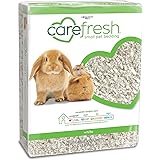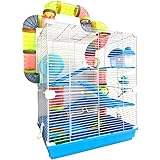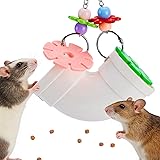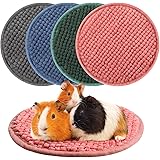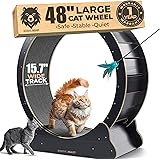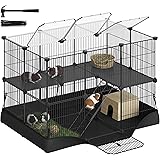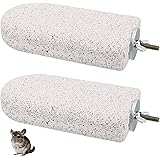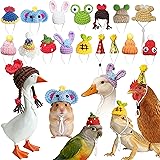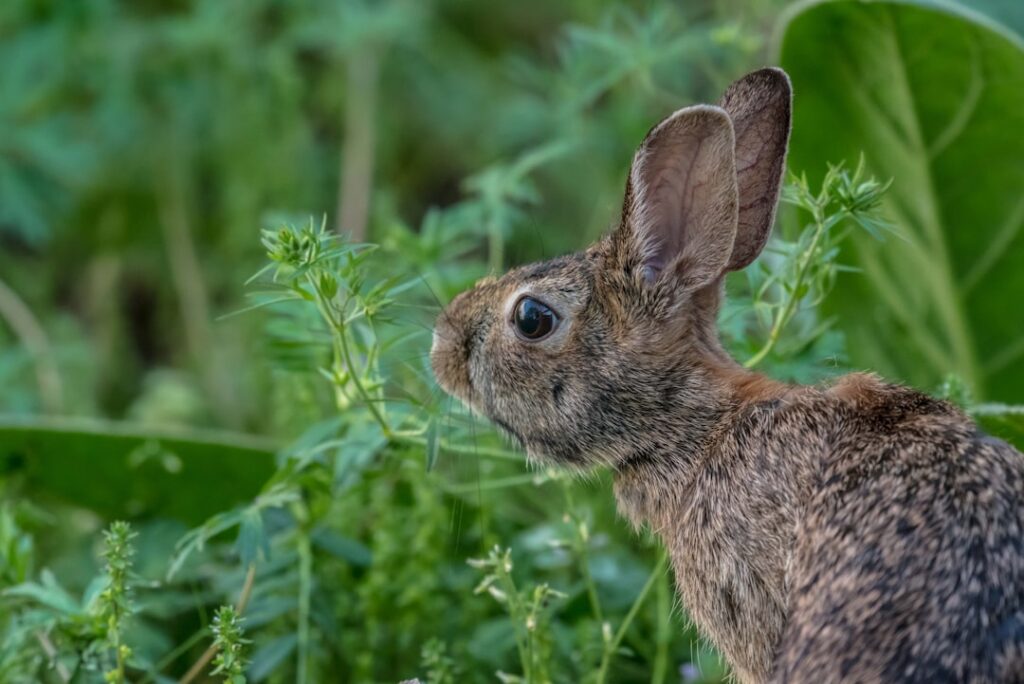
Niteangel Super-Silent Hamster Exercise Wheels - Quiet Spinner Hamster Running Wheels with Adjustable Stand for Hamsters Gerbils Mice Or Other Small Animals (M, Transparent)
$36.99 (as of 02/08/2026 14:07 GMT +00:00 - More infoProduct prices and availability are accurate as of the date/time indicated and are subject to change. Any price and availability information displayed on [relevant Amazon Site(s), as applicable] at the time of purchase will apply to the purchase of this product.)Carefresh 99% Dust-Free White Natural Paper Small Pet Bedding with Superior 10 Day Odor Control & Absorption, for Guinea Pigs, Hamsters, Rabbits, & Rats, 50 L
$22.99 (as of 02/08/2026 14:07 GMT +00:00 - More infoProduct prices and availability are accurate as of the date/time indicated and are subject to change. Any price and availability information displayed on [relevant Amazon Site(s), as applicable] at the time of purchase will apply to the purchase of this product.)MZNZ Dog Cat Playpen, Portable Puppy Pet Crate Indoor for Small Dogs Cats Rabbits, Foldable Dog Cage Enclosure for Outdoor, Pop Up Dogs Tent Kennel with Carrying Case, Grey
$14.99 (as of 02/08/2026 14:07 GMT +00:00 - More infoProduct prices and availability are accurate as of the date/time indicated and are subject to change. Any price and availability information displayed on [relevant Amazon Site(s), as applicable] at the time of purchase will apply to the purchase of this product.)Large 5-Floors Blue Hamster Mansion Habitat Home House Cage Paw Safe Solid Platform with Hide House Running Excerise Wheel Food Bowl Water Bottle Deep Base
$57.68 (as of 02/08/2026 14:07 GMT +00:00 - More infoProduct prices and availability are accurate as of the date/time indicated and are subject to change. Any price and availability information displayed on [relevant Amazon Site(s), as applicable] at the time of purchase will apply to the purchase of this product.)Kaytee Clean & Cozy Lavender Paper Bedding For Pet Guinea Pigs, Rabbits, Hamsters, Gerbils, and Chinchillas, 49.2 Liters
$19.95 (as of 02/08/2026 14:07 GMT +00:00 - More infoProduct prices and availability are accurate as of the date/time indicated and are subject to change. Any price and availability information displayed on [relevant Amazon Site(s), as applicable] at the time of purchase will apply to the purchase of this product.)AOWPFVV Rat Enrichment Toys, Rat Foraging Toy for Various Treats, Slow Feeder Hanging Fancy Mice Cage Accessories Puzzle Toy More Healthy, Easy-Clean Rodent Toys for Rats, Mice or Parakeets
$9.99 (as of 02/08/2026 14:07 GMT +00:00 - More infoProduct prices and availability are accurate as of the date/time indicated and are subject to change. Any price and availability information displayed on [relevant Amazon Site(s), as applicable] at the time of purchase will apply to the purchase of this product.)Mity rain Ferret Toys with 3 Balls Inclueded, Lightweight Collapsible Tunnel Tube Accessories for Ferrets, Guinea Pigs, Hamsters, Expandable Interactive Toys Supplies for Small Pets
$9.99 (as of 02/08/2026 14:07 GMT +00:00 - More infoProduct prices and availability are accurate as of the date/time indicated and are subject to change. Any price and availability information displayed on [relevant Amazon Site(s), as applicable] at the time of purchase will apply to the purchase of this product.)Magic Finish Pet Odor & Stain Remover (32 oz) – Enzyme Carpet Cleaner for Dog & Cat Urine, Vomit, and Messes – Kid & Pet-Friendly Rug & Multisurface Upholstery Deodorizer with Apple Blossom Scent
$14.99 (as of 02/08/2026 14:07 GMT +00:00 - More infoProduct prices and availability are accurate as of the date/time indicated and are subject to change. Any price and availability information displayed on [relevant Amazon Site(s), as applicable] at the time of purchase will apply to the purchase of this product.)Oxbow Essentials Guinea Pig Food, Adult Guinea Pig, Made with Oxbow Timothy Hay, Pet Food Pellets with Vitamin C, Small Animal Pet Products, Made in USA, High Fiber, 5 lb. bag
$12.40 (as of 02/08/2026 14:07 GMT +00:00 - More infoProduct prices and availability are accurate as of the date/time indicated and are subject to change. Any price and availability information displayed on [relevant Amazon Site(s), as applicable] at the time of purchase will apply to the purchase of this product.)Floppy eared bunnies have become increasingly popular as pets in recent years. Their adorable appearance and gentle nature make them irresistible to many people. The appeal of floppy eared bunnies lies not only in their cute looks but also in their docile temperament and ability to form strong bonds with their owners.
One of the main reasons why floppy eared bunnies are so appealing is their appearance. Their long, droopy ears give them a unique and endearing look that is hard to resist. These floppy ears are not only cute but also serve a purpose. They help bunnies regulate their body temperature by dissipating heat, making them well-suited for warmer climates.
In addition to their appearance, floppy eared bunnies are known for their gentle and friendly nature. They are generally calm and easygoing, which makes them great companions for both individuals and families. Floppy eared bunnies are also highly social animals and enjoy interacting with their owners. They can form strong bonds with humans and often seek out affection and attention.
Key Takeaways
- Floppy eared bunnies are popular pets due to their cute and cuddly appearance.
- When choosing a bunny, consider their breed and characteristics to ensure a good fit for your lifestyle.
- Creating a safe and comfortable home for your bunny involves providing adequate space, hiding spots, and litter boxes.
- A healthy and balanced diet for your bunny includes hay, fresh vegetables, and limited pellets.
- Grooming your bunny involves regular brushing and nail trimming, as well as checking for any health issues.
Choosing the Right Bunny: Breeds and Characteristics to Consider
When choosing a bunny, it is important to consider the different breeds and their characteristics. There are several breeds of bunnies, each with its own unique traits and temperaments. Some popular breeds of floppy eared bunnies include the Holland Lop, Mini Lop, and English Lop.
The Holland Lop is one of the most popular breeds of floppy eared bunnies. They are known for their small size and compact body shape. Holland Lops have a friendly and outgoing personality, making them great pets for families with children.
The Mini Lop is another popular breed of floppy eared bunny. They are slightly larger than Holland Lops but still have a compact body shape. Mini Lops are known for their sweet and gentle nature, making them great companions for individuals or families.
The English Lop is a larger breed of floppy eared bunny. They have long, droopy ears that can reach up to 21 inches in length. English Lops are known for their calm and laid-back temperament, making them great pets for those looking for a more relaxed companion.
When choosing a bunny, it is important to consider your lifestyle and personality. Some bunnies may require more attention and care than others, so it is important to choose a breed that fits well with your lifestyle. It is also important to consider the space you have available for your bunny and whether or not you have the time and resources to properly care for them.
Creating a Safe and Comfortable Home for Your Bunny
Creating a safe and comfortable home for your bunny is essential to their well-being. Bunnies are curious animals and can easily get into trouble if their environment is not properly set up. Here are some tips for creating a bunny-friendly living space:
1. Provide a spacious enclosure: Bunnies need plenty of space to hop around and explore. A minimum of 4 square feet of space per bunny is recommended, but more is always better. Make sure the enclosure has enough room for your bunny to stretch out and move around comfortably.
2. Use appropriate bedding: Choose bedding that is safe and comfortable for your bunny. Avoid using cedar or pine shavings, as they can be harmful to bunnies’ respiratory systems. Instead, opt for paper-based bedding or hay.
3. Provide hiding spots: Bunnies like to have a place to retreat to when they feel scared or overwhelmed. Provide hiding spots such as tunnels or boxes in their enclosure where they can feel safe and secure.
4. Bunny-proof your home: Bunnies are curious creatures and love to explore their surroundings. Make sure to bunny-proof your home by removing any toxic plants, electrical cords, or other hazards that could harm your bunny.
5. Provide toys and enrichment: Bunnies need mental stimulation to prevent boredom. Provide toys such as chew toys, tunnels, and puzzle feeders to keep your bunny entertained and engaged.
Feeding Your Bunny: Tips for a Healthy and Balanced Diet
| Food Type | Recommended Amount | Frequency |
|---|---|---|
| Hay | Unlimited | Daily |
| Pellets | 1/4 cup per 5 lbs of body weight | Daily |
| Vegetables | 1-2 cups per 5 lbs of body weight | Daily |
| Fruits | 1-2 tablespoons per 5 lbs of body weight | Occasionally |
| Treats | Small amounts | Occasionally |
Feeding your bunny a healthy and balanced diet is crucial for their overall health and well-being. Bunnies have specific dietary needs and require a diet that is high in fiber and low in sugar. Here are some tips for feeding your bunny:
1. Hay is the foundation of a bunny’s diet: Hay should make up the majority of your bunny’s diet. It is important to provide unlimited access to fresh, high-quality hay such as timothy hay or orchard grass. Hay helps keep your bunny’s digestive system healthy and prevents dental issues.
2. Fresh vegetables: Bunnies should also be fed a variety of fresh vegetables daily. Leafy greens such as kale, romaine lettuce, and spinach are good options. It is important to introduce new vegetables slowly to avoid digestive upset.
3. Limited pellets: Pellets should be fed in moderation as they can be high in calories and sugar. Choose a high-quality pellet that is specifically formulated for bunnies and feed according to the manufacturer’s instructions.
4. Treats in moderation: Bunnies can enjoy treats in moderation, but it is important to choose healthy options. Fresh fruits such as apples or berries can be given as an occasional treat.
5. Fresh water: Make sure your bunny always has access to fresh, clean water. Change the water daily to ensure it stays fresh.
Bunny Grooming 101: Keeping Your Bunny Clean and Well-Maintained
Grooming your bunny is an important part of their care routine. Regular grooming helps keep your bunny clean and healthy and can also help prevent common health issues such as hairballs. Here are some tips for grooming your bunny:
1. Brushing: Bunnies have dense fur that can easily become matted if not properly maintained. Regular brushing helps remove loose fur and prevents matting. Use a soft brush or comb to gently brush your bunny’s fur, paying special attention to areas such as the back and hindquarters.
2. Nail trimming: Bunnies’ nails can grow long and sharp if not regularly trimmed. Trim your bunny’s nails every 4-6 weeks using a pair of small animal nail clippers. Be careful not to cut the quick, which is the blood vessel inside the nail.
3. Ear cleaning: Bunnies with floppy ears are prone to ear infections, so it is important to keep their ears clean. Use a damp cloth or cotton ball to gently wipe the inside of your bunny’s ears, being careful not to insert anything into the ear canal.
4. Dental care: Bunnies’ teeth continuously grow throughout their lives, so it is important to provide them with proper dental care. Provide plenty of hay for your bunny to chew on, as this helps wear down their teeth naturally. Regular dental check-ups with a veterinarian are also recommended.
5. Bathing: Bunnies generally do not require regular baths unless they get particularly dirty or have a medical condition that requires it. If you do need to bathe your bunny, use a gentle rabbit-safe shampoo and make sure to thoroughly dry them afterwards to prevent chilling.
Bunny Behavior: Understanding Your Floppy Eared Friend’s Habits and Personality

Understanding your bunny’s behavior is key to building a strong bond with them and providing them with the care they need. Bunnies have unique habits and personalities that can vary from individual to individual. Here are some common behaviors and personality traits of bunnies:
1. Binkying: Binkying is a behavior commonly seen in bunnies where they jump and twist in the air. It is a sign of happiness and contentment.
2. Chinning: Bunnies have scent glands on their chin that they use to mark their territory. Chinning is a behavior where bunnies rub their chin on objects to leave their scent.
3. Thumping: Bunnies will often thump their hind legs on the ground as a warning sign when they sense danger or feel threatened.
4. Licking: Bunnies will often lick their owners as a sign of affection and to groom them. It is a behavior that shows trust and bonding.
5. Digging: Bunnies are natural diggers and will often dig at the ground or in their bedding. Providing a digging box or designated digging area can help satisfy this natural behavior.
Bunnies also have individual personalities that can vary from shy and reserved to outgoing and adventurous. It is important to spend time getting to know your bunny and understanding their unique personality traits. This will help you provide them with the care and attention they need.
Bunny Playtime: Fun Activities and Toys for Your Bunny’s Entertainment
Playtime is an important part of a bunny’s daily routine. Bunnies are active animals that need mental and physical stimulation to stay happy and healthy. Here are some fun activities and toys for your bunny’s entertainment:
1. Tunnel play: Bunnies love to explore tunnels and burrow through them. Provide tunnels made of cardboard or fabric for your bunny to play in.
2. Puzzle feeders: Puzzle feeders are toys that require your bunny to work for their food. They provide mental stimulation and help prevent boredom.
3. Chew toys: Bunnies have constantly growing teeth, so it is important to provide them with plenty of chew toys to keep their teeth worn down. Wooden toys or untreated wicker baskets make great chew toys for bunnies.
4. Hide and seek: Bunnies love to play hide and seek. Hide treats or toys around their enclosure for them to find, or play a game of peek-a-boo with them.
5. Bonding time: Spending time bonding with your bunny is important for their overall well-being. Sit on the floor with your bunny and let them come to you. Offer treats or gentle pets to reinforce positive interactions.
Remember to always supervise your bunny during playtime and provide a safe and secure environment for them to play in.
Bunny Health and Wellness: Common Health Issues and How to Prevent Them
Like any pet, bunnies can experience health issues from time to time. It is important to be aware of common health issues that bunnies face and take steps to prevent them. Here are some common health issues in bunnies and how to prevent them:
1. Dental problems: Bunnies’ teeth continuously grow throughout their lives, which can lead to dental issues if not properly maintained. Provide plenty of hay for your bunny to chew on, as this helps wear down their teeth naturally. Regular dental check-ups with a veterinarian are also recommended.
2. Gastrointestinal stasis: Gastrointestinal stasis, also known as a “gut stasis,” is a common condition in bunnies where their digestive system slows down or stops working altogether. This can be caused by a variety of factors, including a poor diet, lack of exercise, or stress. To prevent gastrointestinal stasis, it is important to provide your bunny with a healthy diet high in fiber, plenty of exercise, and a stress-free environment.
3. Hairballs: Bunnies groom themselves regularly, which can lead to the ingestion of fur. If too much fur is ingested, it can form hairballs in the digestive system. To prevent hairballs, regularly groom your bunny to remove loose fur and provide plenty of hay for them to chew on, as this helps move fur through their digestive system.
4. Flystrike: Flystrike is a serious condition where flies lay eggs on a bunny’s fur, which then hatch into maggots and feed on the bunny’s flesh. To prevent flystrike, it is important to keep your bunny’s living area clean and free of feces, as flies are attracted to dirty environments. Regularly check your bunny for any signs of flystrike, such as soiled fur or maggots, and seek veterinary attention immediately if you suspect flystrike.
5. Heatstroke: Bunnies are sensitive to heat and can easily overheat in hot weather. To prevent heatstroke, make sure your bunny has access to shade and fresh water at all times. Avoid placing their enclosure in direct sunlight and provide a cool surface for them to lie on, such as a ceramic tile.
Regular veterinary check-ups are also important for maintaining your bunny’s health and catching any potential issues early on.
Bunny Training: Teaching Your Bunny Basic Commands and Tricks
Training your bunny can be a fun and rewarding experience for both you and your furry friend. Bunnies are intelligent animals that can learn basic commands and tricks with patience and positive reinforcement. Here are some tips for training your bunny:
1. Start with basic commands: Begin by teaching your bunny basic commands such as “come” or “stay.” Use a clicker or a verbal cue followed by a treat to reinforce the desired behavior.
2. Use positive reinforcement: Bunnies respond well to positive reinforcement, so be sure to reward them with treats or praise when they perform the desired behavior. Avoid using punishment or negative reinforcement, as this can cause stress and fear in your bunny.
3. Keep training sessions short: Bunnies have short attention spans, so it is important to keep training sessions short and frequent. Aim for 5-10 minute sessions a few times a day.
4. Be patient: Training takes time and patience, so be prepared to repeat commands and reinforce behaviors consistently. Bunnies learn at their own pace, so it is important to be patient and understanding.
5. Use treats wisely: Treats can be a powerful motivator for bunnies, but it is important to use them wisely. Use small, healthy treats and avoid overfeeding your bunny.
Remember that training should always be a positive experience for both you and your bunny. If your bunny seems stressed or uninterested, take a break and try again later.
The Joy of Owning a Floppy Eared Bunny and the Responsibility That Comes with It
Owning a floppy eared bunny can bring immense joy and companionship into your life. Their adorable appearance, gentle nature, and ability to form strong bonds with their owners make them wonderful pets. However, it is important to remember that owning a bunny also comes with responsibility.
Bunnies require proper care, attention, and commitment to ensure their health and well-being. They need a safe and comfortable living environment, a healthy diet, regular grooming, mental and physical stimulation, and regular veterinary care. It is important to be a responsible pet owner by providing all of these things for your bunny.
Owning a bunny is a long-term commitment that can span 10 years or more. Before bringing a bunny into your home, it is important to consider the responsibilities and care that come with owning one. Bunnies require a proper diet, regular exercise, and a safe and comfortable living environment. They also need regular veterinary check-ups and vaccinations to ensure their health and well-being. Additionally, bunnies are social animals and need daily interaction and mental stimulation. It is crucial to have enough time and dedication to provide them with the love and attention they need. Before making the decision to bring a bunny into your home, it is essential to thoroughly research and understand the commitment involved in order to provide them with a happy and fulfilling life.
FAQs
What is a floppy eared bunny?
A floppy eared bunny is a breed of domestic rabbit that has long, droopy ears that hang down on either side of its head.
What breeds of rabbits have floppy ears?
Some of the most popular breeds of rabbits with floppy ears include the Holland Lop, the French Lop, the English Lop, and the Mini Lop.
What is the temperament of a floppy eared bunny?
Floppy eared bunnies are generally known for being friendly, affectionate, and social animals. They enjoy interacting with their owners and can make great pets.
What do floppy eared bunnies eat?
Floppy eared bunnies are herbivores and primarily eat hay, fresh vegetables, and fruits. It is important to provide them with a balanced diet to ensure their health and well-being.
How do you care for a floppy eared bunny?
Caring for a floppy eared bunny involves providing them with a clean and spacious living environment, a healthy diet, and regular grooming. They also require regular exercise and socialization to stay happy and healthy.
What is the lifespan of a floppy eared bunny?
The lifespan of a floppy eared bunny can vary depending on the breed and their overall health and care. On average, they can live anywhere from 7 to 12 years.


